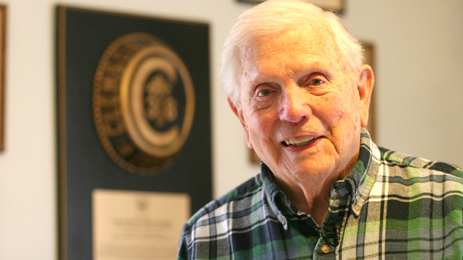‘A Living Icon’

Bobby Rettew/Courtesy Clemson Athletic Communications
A survivor of the Bataan Death March in World War II, retired U.S. Army Col. Ben Skardon is a beloved Clemson University alumnus and professor emeritus. In addition, he is the most sought-after speaker at the annual Bataan Memorial Death March in New Mexico, according to friend Cheryl Fallstead.
Bataan Death March survivor, Clemson legend Skardon to walk in annual memorial march
By Ken Scar
Clemson Media Relations
news@thepccourier.com
CLEMSON — Retired U.S. Army Col. Beverly N. (Ben) Skardon, 97, a survivor of the Bataan Death March and beloved alumnus and professor emeritus of Clemson University, will walk eight-and-a-half miles in the annual Bataan Memorial Death March on the White Sands Missile Range in New Mexico on March 22.
This will be the eighth time Skardon has participated in the event.
More than 6,500 active-duty service members, veterans, wounded warriors and civilians will run or walk a 26.2-mile route or 14-mile route through the unforgiving terrain of the high desert — many carrying 35 pounds on their backs — to honor Skardon and his fellow survivors who endured the real march.
Skardon was a commander of Company A of the 92nd Infantry Regiment PA (Philippine Army), a battalion of Filipino Army recruits on the Bataan Peninsula in the Philippines.
He became a prisoner of war with tens of thousands of his brothers-in-arms when American troops in that area of operation were forced to surrender to the Japanese on April 9, 1942.
He lived through one of the most infamous ordeals of World War II, the Bataan Death March, in which thousands of sick, wounded and starving soldiers were marched 80 miles in the searing heat through the Philippine jungles.
Thousands died. Those whot survived the march then had to survive the inhumane and brutal conditions of Japanese prisoner-of-war camps.
Skardon survived for more than three years in the camps, despite becoming deathly ill.
Two fellow Clemson alumni, Henry Leitner and Otis Morgan, kept him alive by spoon-feeding him and eventually trading his gold Clemson ring — which he had managed to keep hidden — for food. Leitner and Morgan did not survive the war.
Incredibly, Skardon also survived the sinking of two unmarked Japanese transport ships carrying him and other POWs to mainland Japan. Russian units finally freed him in August 1945.
“The colonel has told me that he marches to honor fallen comrades. This includes, but is not limited to, Clemson men Henry Leitner and Otis Morgan, whom he credits with saving his life,” said 1984 Clemson graduate David Stalnaker, who has made all but one of the memorial marches with Skardon. “He says the march inspires him, but I have found it is the colonel who is inspiring.”
Skardon will be accompanied by 25 members of Ben’s Brigade, a group of admirers and supporters from around the country that includes many Clemson alumni who are his former students.
At the eight-mile mark, barring any glitch in cellphone reception, Skardon will make a FaceTime call to Clemson University President James P. Clements.
“Colonel Skardon has been an inspiration to thousands of Clemson students, both as a teacher and a role model for duty, service and sacrifice for country,” Clements said. “I’m proud to be an honorary member of Ben’s Brigade, and I thank all of the alumni who are marching with him in person or in spirit.”
Skardon’s nephew, Hooper Skardon, 72, escorts his uncle in every march.
“To get into his love and ties to Clemson would be a book,” Hooper Skardon said. “He is truly a Tiger.”
Skardon has long been a celebrity at the event, and his talks before the march draw standing-room-only crowds.
“The day before, survivors are each given a classroom to share their experiences with marchers,” said Cheryl Fallstead, a local New Mexico writer who will be marching with Skardon for the seventh time. “Ben Skardon is the most sought-after speaker and is given the largest room. I tell you, these men are treated like rock stars. After their talks, they are crowded with young men and women, many in the military, seeking photos with them and asking for autographs.”
“Uncle Ben is a living icon,” said Hooper Skardon. “He is kind, loving and a true Southern gentleman. He is truly an American hero, and his love for his country goes without saying. I feel very humbled to be related to him.”



























